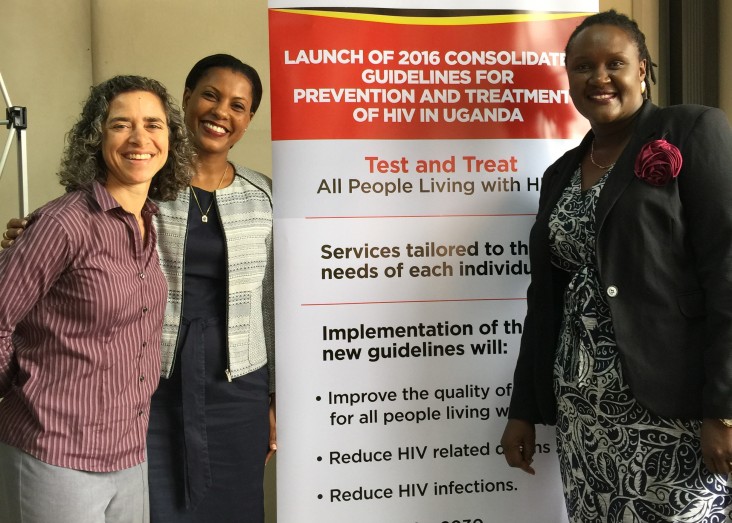Speeches Shim

Delivering Critical HIV/AIDS Services in the Face of COVID-19
We woke up one day and our world had changed. The novel coronavirus disease (COVID-19) had arrived. As a lockdown was put in place to mitigate the spread of the virus, plans and daily routines ground to a halt. Communities and individuals alike tried to figure out how to adapt to a world transformed by stay-at-home orders and physical distancing.
While the ongoing COVID-19 pandemic and associated physical-distancing guidelines continue to impact everybody, people living with HIV in Uganda face unique challenges. With the need to seek ongoing care in crowded facilities, a freeze on public transport, and a disease that compromises the immune system, people living with HIV suddenly became even more vulnerable. Urgent action was needed.
USAID is delivering knowledge, tools, and resources to combat the impact of COVID-19 on all health outcomes. In addition, USAID is working with the Uganda Ministry of Health and district authorities to ensure that critical health services, such as treatment for HIV, tuberculosis, malaria, and maternal and child care services continue during the pandemic. USAID is also helping the government to strengthen laboratory systems, risk communications, case management, infection prevention and control, and supply chain technical assistance to help the COVID-19 response.
USAID staff like Jacqueline Calnan have been working tirelessly to ensure that people living with HIV/AIDS in Uganda continue to receive life-saving antiretroviral treatment (ARV) during the lockdown. Calnan is the deputy team leader for HIV in the Health and HIV Office at USAID/Uganda. She also serves as co-chair for the U.S. Government Care and Treatment Technical Working Group within the President's Emergency Plan For AIDS Relief (PEPFAR) team in Uganda, in addition to sitting on many national task forces.
In Uganda, where approximately 1.3 million people live with HIV/AIDS, continuity of critical HIV prevention, care and treatment services during COVID-19 has been a challenge. As USAID’s representative on the Ministry of Health’s national HIV task force, Calnan has been involved in developing operational guidelines for HIV services in the context of COVID-19.The guidelines ensure continuity of critical HIV services delivery and reduce congestion in health facilities to minimize the risk of COVID-19 transmission to people living with HIV, health staff, and other patients.
According to Calnan, the top priority is to ensure that people living with HIV continue their antiretroviral (ARV) treatment. “We have come up with several innovative initiatives to deliver the ARVs to the clients, for instance, by boda-bodas (motorcycle taxis), through peers, or to a location within walking distance. This can be deep in the villages, off the beaten track,” says Calnan. “It is always the 'last mile' that is the most difficult, but also the most critical as the 'last mile' can mean the difference between life and death for our clients,” she adds.
“We have had to adapt all our HIV/AIDS programs to minimize contact with the people we serve, which is particularly difficult when it comes to health care,” says Calnan.
To ensure effective delivery of life-saving ARV drugs, the task force has introduced a decentralized communication system between partners, health facilities, and clients. USAID plans and coordinates when and where drugs are delivered in a manner that meets the needs and preferences of the clients they serve. “This is the only way our clients can receive the life-saving drugs on time. To the extent possible, we also provide multi-month dispensing of drugs to ensure clients have sufficient drugs during this lockdown period” [and reduce the need for in-person contact with health services] Calnan adds.
USAID emphasizes the need to keep in touch with clients and offer much-needed support to stay in care and adhere to treatment. Through SMS, WhatsApp, social media communication, and radio announcements, clients are informed about the locations of the community’s drug distribution points. “It is like a very big jigsaw puzzle to make it work, and without modern electronic communication and support from the networks of people living with HIV, this would not be possible,” Calnan adds.
Calnan is just one of the many USAID staff in Uganda who are working every day to ensure that even in the face of COVID-19, essential operations like HIV/AIDS prevention, care, and treatment services continue, and lives are saved.

Comment
Make a general inquiry or suggest an improvement.